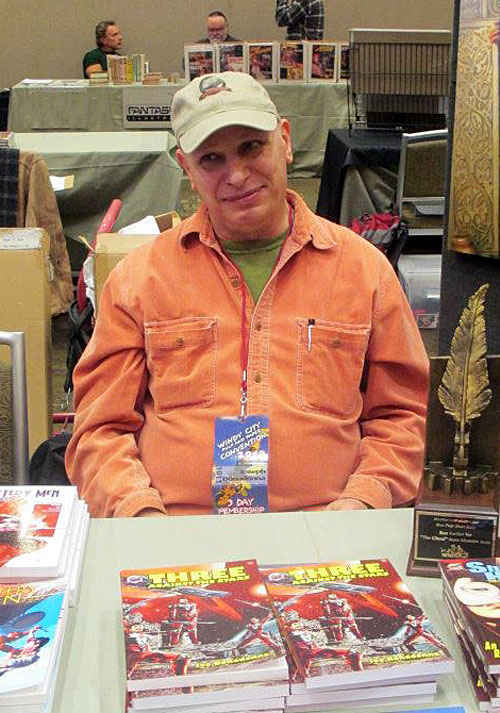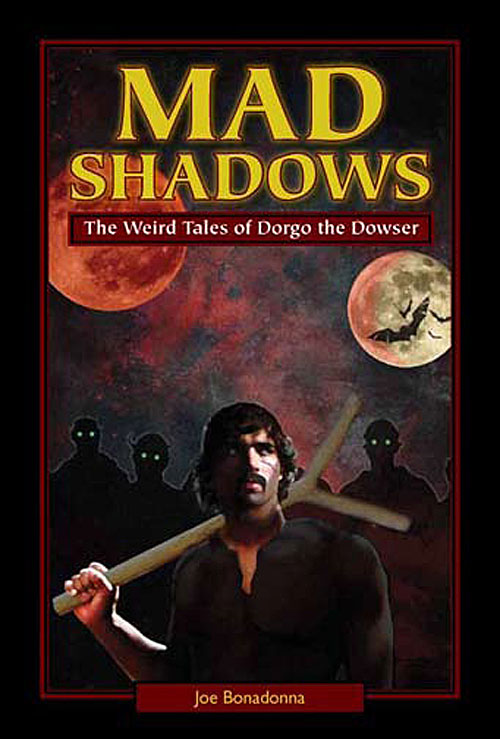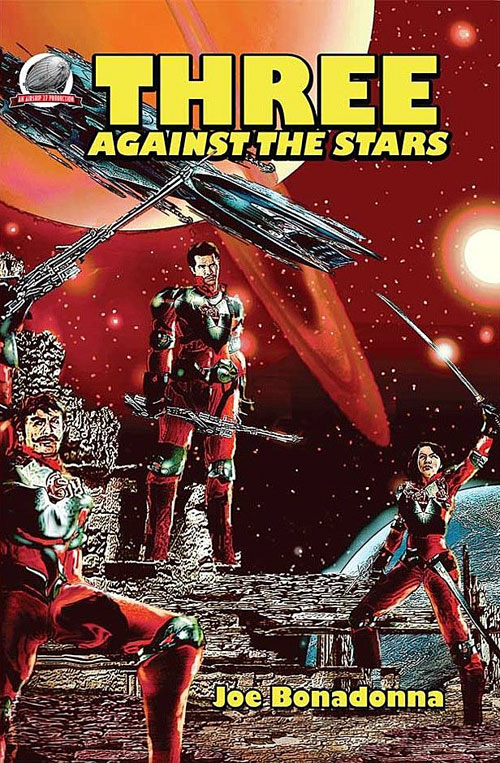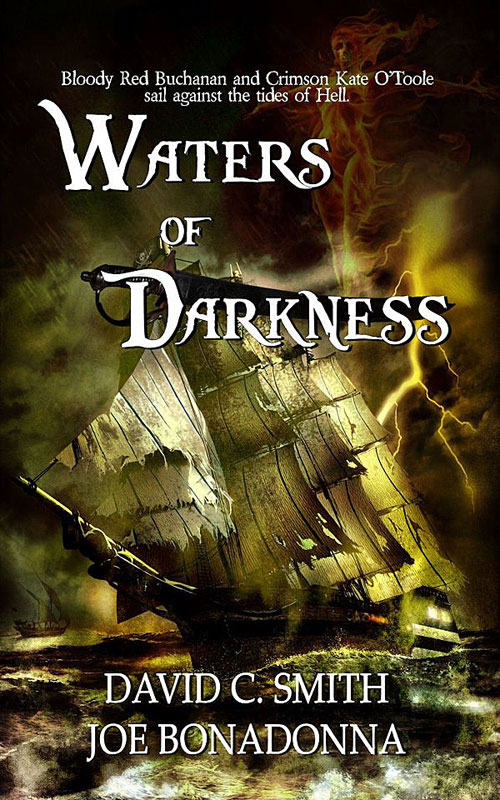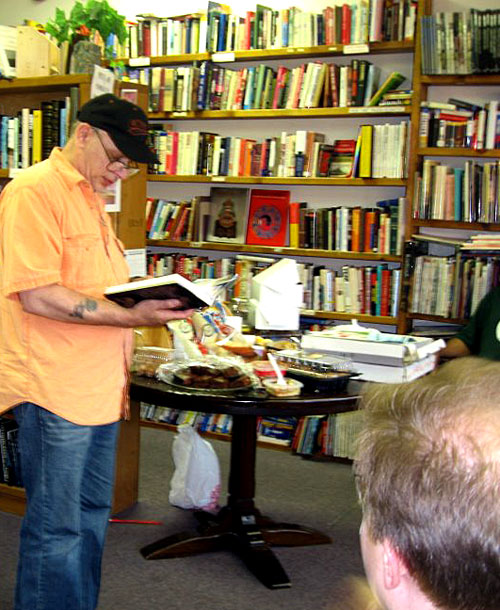Writing, // June 7, 2015
Joe Bonadonna — WRITER
Interview with writer Joe Bonadonna —
1. Who are you and what do you do?
My name is Joe Bonadonna, and I live in Chicago, IL. I’m retired from the 9 to 5 grind, and now I write, edit, promote, network, etc. I played in scores of local rock bands between 1964 and 1984, and have been writing heroic fantasy, space opera, and sword & sorcery off and on for about 40 years or so. Although there are elements of the supernatural in my fantasy tales, I’d never written a horror story up until about a year or so, when I wrote my first and so far only such yarn. I would like to try writing a horror novel, based on an unsold screenplay I wrote in 1997, but who knows if that will ever happen.
My three novels are: the heroic fantasy Mad Shadows: The Weird Tales of Dorgo the Dowser, published by iUniverse; the space opera Three Against The Stars, published by Airship 27 Productions; and the sword & sorcery pirate adventure, Waters of Darkness, which was co-written by veteran fantasy author David C. Smith, and published by Damnation Books. Currently, I have stories in: Poets in Hell and Heroika 1: Dragon Eaters — both created and edited by Janet Morris, and published by Perseid Press; Griots: Sisters of the Spear, edited by Milton J. Davis and Charles Saunders, and published by MVmedia; Azieran Presents: Artifacts and Relics — Extreme Sword and Sorcery, created and edited by Christopher Heath, and published by Heathen Oracle; and Sinbad: The New Voyages, Vol. 4, created and edited by Ron Fortier, published by Airship 27 Productions. Next up for summer 2015 will be a story in Doctors in Hell — volume 18 in Janet Morris’ classic series, Heroes in Hell.
2. Why writing?
Because I got thrown out of medical school for body snatching and experimenting with the reanimation of dead tissue. Seriously, though, I’ve always been something of a natural-born fabricator and exaggerator of the truth — I’ve enjoyed telling tall tales ever since I was a kid. Starting as far back as I can remember I was a fairly voracious reader. I really have no memory of learning to read and write, of when and how that happened; it just seems as if I’ve always been able to do both. My Dad worked next door to a book bindery called Spinner Brothers, and was friends with the manager there. So Dad always brought home these wonderful books for me back in the late 1950s and early 1960s, many of them educational books for kids; they had no dust jackets, however; the books were shipped elsewhere for that. The only publisher I remember among the lot is Grosset and Dunlap. I am very fortunate that both my parents encouraged and supported me in anything I tried my hand at. They always believed in me.
3. What is your earliest memory of wanting to be a writer?
That occurred in 4th grade — 1962/1963. It happened after watching an episode of Joseph Stefano’s original The Outer Limits television show. The episode is called “Nightmare,” and the next day I wrote a sequel about the alien Ebonites landing in and attacking my old Chicago neighborhood. Big mistake on their part. I also wrote a play in 6th grade called “The Return of the Greatest Monster Ever,” which was a sequel to Frankenstein Meets The Wolf Man. Unfortunately, no one in the neighborhood said, “Hey — my Dad has a barn. Let’s put on a play!” Today we call what I did back then “fan fiction.”
4. What are your favorite subject(s) and style(s)?
Myths, legends, history, music and film are subjects I enjoy, as well as fantasy, horror, mysteries, and science fiction. As for style, well, it all depends: what I grew up reading is what I now write. Take my Three Against The Stars, for example, which was heavily influenced by Flash Gordon. I attempted to write that one in the style of classic space operas, using the fast pace of old-school pulp fiction, but with a more hip ring to it. For Waters of Darkness, David C. Smith and I tried to channel Rafael Sabatini and Alexandre Dumas, although with a more modern approach. For the stories in Mad Shadows, which are mostly written in first person, I once again took a pulp fiction approach, emulating Raymond Chandler’s prose and style. As for stories I’ve written for Poets in Hell and Doctors in Hell . . . I wanted a more literary, even poetic style. My stories written in first person are always told in the voice of the main character, of course: they dictate tone and style.
5. How do you work and approach your subject?
I don’t really think about subjects when I write. But allow me to illustrate what I mean by telling you how I write my heroic fantasy tales of Dorgo the Dowser, which I call “gothic noir.” Most of these stories are little puzzles or mini-mysteries, and I usually start with what Alfred Hitchcock called the “McGuffin;” maybe you can say that’s the “subject” of the story. Or perhaps I’ll start with a character or two. Then I build from there: my stories are not about the McGuffin but about the people who come into its orbit. Why do they want it? To what lengths will they go to possess it? Will they beg, borrow, betray, lie, cheat, steal, or kill? What do they plan to do with it? Hide it, use it, sell it, give it away, or destroy it?
Sometimes a theme will come out during the course of writing a story, such as death, which in one yarn led me to writing about the funerary customs of various races and cultures. In other stories I dealt with the loss of wealth, love, family, and friends. A lot of my stories deal with a loss of one kind or another. But I rarely set out with anything specific in mind; I just want to write an interesting and exciting story. Whatever comes out during the writing process is rarely planned for . . . it comes from the Id, I guess.
6. What are your favorite written works, writers?
I was afraid you were going to ask this question! Okay, let me go with the writers who influenced me the most, instead: Fritz Leiber, Robert E. Howard, J.R.R. Tolkien, Edgar Rice Burroughs, Joseph Stefano, and Rod Serling were among the first. And then later I added Raymond Chandler, Dasheil Hammett, James M. Cain, Cornell Woolrich, Janet Morris, Stephen R. Donaldson, and Guy Gavriel Kay. Films have had a huge influence on me, especially Hitchcock. Screenwriters such as Ben Hecht and Charles MacArthur, Charles Brackett, Leigh Brackett, Preston Sturges, Billy Wilder and I.A.L. Diamond also influenced me. The films of Howard Hawks really showed me a cool way to write dialogue. Special FX maestro Ray Harryhausen still looks over my shoulder: in freshman year of high school I wrote a sequel to Jason and The Argonauts, using various bits and pieces torn from the pages of Edith Hamilton’s book Mythology: Timeless Tales of God and Heroes. I called this innocent attempt at screenwriting Jason and The Glass Impala. In every story I’ve thus far written and published, there is some type of “Harryhausen creature.” Airship 27’s Sinbad: The New Adventures continues where his Sinbad films left off. My one contribution, “Sinbad and The Golden Fleece,” is my homage to Ray Harryhausen.
7. What are the best responses you have had to your work?
People like my characters. They like my dialogue and sense of humor, and my action scenes. Women have really fallen for Dorgo the Dowser. Mad Shadows: The Weird Tales of Dorgo the Dowser has garnered many 5-star reviews. Dorgo is my legacy character, I guess you can say. The fact that Janet Morris invited me to write for her Heroes in Hell series, and now for Heroika, is a pretty amazing response to my work.
8. What do you like about your work?
I try to write for the heart, not for the head, and I think I succeed in that. I don’t feel that I have anything of grave importance to say, and I don’t want to make people think about anything in particular — they will form their own thoughts and ideas while reading my stories. I just want to entertain and, above all, I want to make people feel something. I think there is some warm and comforting aspect about my stories, no matter the plot or setting. Someone told me that reading my stories is like reconnecting with a long-lost friend. That makes me smile. I want to touch emotions, make people laugh and cry.
9. What advice would you give to other writers?
Write what you feel, what you love. Explore human emotions, relationships, and the way people interact. Remember: dialogue is action, and it can move the story forward, conveying information that, if given as exposition can all too often be dull and boring. Show, don’t tell: action speaks louder than words. In screenwriting, you can’t write what can’t be filmed, like thoughts and emotions: you have to show what characters are thinking and feeling through something they do, how they react to a situation. Anger? Have them throw something at the wall. Nervous? Have them light a cigarette or pour a drink. Happy? Have them dance around a room. Very simple, really. I also suggest that you read outside the genre in which you write: don’t limit yourself to just horror or fantasy — read romance, history, mythology, mysteries, WWII thrillers . . . read a little bit of everything. Write and revise, and don’t be afraid to cut the fat. And a good editor can make all the difference between a so-so story and a very good or even great one.
10. Where do you see yourself in 5-10 years?
Hopefully not in the crematorium! I don’t know . . I’ll be 73 in 10 years. Wow! I just hope I’m still in decent health, not dependent on anyone, and still able to get around. Maybe I’ll finally make it out to Arizona permanently, help out on an old friend’s ranch. Maybe I’ll even take up golf . . . or at least learn to drive the cart.
LINKS —
Facebook: https://www.facebook.com/pulpfictionrules
Facebook (Bonadonna’s Bookshelf): https://www.facebook.com/BonadonnasBookshelf/timeline
Blog: http://www.dorgoland.blogspot.com/



